Organization For Economic Co
-
- Scrapping Risks Maritime Reporter, May 2018 #12
Traditionally, when a ship reached the end of its economic life, the owner sold it, often to a cash buyer, for scrapping with little consideration of the next step. Many ships ended up on a beach in south Asia (India, Pakistan, or Bangladesh) where they were cut apart and the metal was sold for scrap. The working conditions were sometimes dangerous and hazardous to the workers’ health. In addition, little was sometimes done to protect the environment. For many ship owners these days, scrapping is (or should be) a matter requiring business considerations beyond the offered cash price.
A Belgian ship owner was recently fined €750,000 and two of its senior executives were banned from working in the shipping industry for a year after the company was convicted of the illegal export of vessels for scrapping in south Asian yards. The prosecutor had sought jail time for the executives, but the court expressed reluctance for such a measure as this was the first known criminal prosecution for illegal scrapping.
Basel Convention
The Basel Convention on the Control of Transboundary Movements of Hazardous Wastes and Their Disposal, which entered into effect on May 5, 1992, obligates its member states to reduce the international movements of hazardous wastes to prevent transfer of hazardous waste from developed to less developed countries. Its members consist of virtually every nation, excepting Haiti and the United States. Rather than become party to the Basel Convention, the United States relies on domestic legislation to accomplish the same goals. The definition of hazardous waste in the Basel Convention is complex, but quite broad. The consensus seems to be that ships that have reached the end of their economic life are or should be treated as hazardous waste under the Convention.Hong Kong Convention
The Hong Kong International Convention for the Safe and Environmentally Sound Recycling of Ships, 2009 was negotiated under the International Maritime Organization (IMO) and signed in Hong Kong on May 19, 2009. Parties undertake to give full and complete effect to the Convention’s provisions in order to prevent, reduce, minimize, and, to the extent practicable, eliminate accidents, injuries, and other adverse effects on human health and the environment caused by ship recycling, and enhance ship safety, protection of human health and the environment throughout a ship’s operating life. The convention enters into force 24 months after the date on which the following conditions have been met: (1) not less than 15 states have ratified, approved, or acceded it; (2) the combined merchant fleets of member states constitute not less than 40 percent of the world’s tonnage; and (3) the combined maximum annual ship recycling volume of the member states during the preceding 10 years constitutes not less than 3 percent of the world’s tonnage. To date, there are six member states.OECD Council Decision C(2001) 107/FINAL
The Organization for Economic Co-operation and Development (OECD) promulgated a Council Decision aimed at facilitating trade in recyclables in an environmentally sound and economically efficient manner by using a simplified procedure for trade between member states, as well as a risk-based approach for exports outside the OECD area, whether for recovery or final disposal. This decision of March 30, 1992 and its amendments are specifically intended to be in harmony with the Basel Convention.Thus, member states are obligated to adopt waste export procedures that are consistent with the Basel Convention. There are 35 member states, including the United States, Canada, Mexico, most European nations, Australia, New Zealand, Japan, and South Korea.
The United States adopted regulations in 1996 specifically designed to meet its obligations under the OECD Council Decision. In 2016, these regulations were rolled, without substantive change, into its general regulations under the Resource Conservation and Recovery Act (RCRA).
EU Regulation 1257/2013
The European Union (EU) Regulation on ship recycling and its associated Directive incorporated the Basel Convention and the Hong Kong Convention, making compliance with both mandatory for ships of EU nations and their owners and for other ships that become subject to EU jurisdiction by transiting through EU nations en route recycling. Raising the stakes, the regulation imposes civil and criminal liabilities for noncompliance. This is the regulation that the Belgian shipowner was convicted of violating.US RCRA statute and regulations
The US Resource Conservation and Recovery Act (RCRA) is the principal federal law governing the disposal of solid and hazardous waste. Among other things, it prohibits the export of hazardous waste from the United States unless the receiving nation has been properly advised of the planned export and approved such proposal. The statute includes civil and criminal enforcement mechanisms, including severe penalties for knowing endangerment. RCRA is administered by the Environmental Protection Agency (EPA), which has adopted specific regulations concerning transboundary movements of hazardous waste for recovery or disposal. As discussed above, these EPA regulations meet US obligations under the OECD Council Decision and are in harmony with the Basel Convention.Ship Recycling
Commercial vessels, almost without exception, contain hazardous materials, including but not limited to such items as asbestos, polychlorinated biphenyls (PCBs), and lead and other heavy metals. Thus, the recycling of a ship constitutes the disposal of hazardous waste under international, European, and US federal laws and regulations. The US government recently ceased efforts to export its vessels for scrapping in foreign countries. The Maritime Administration (MARAD) has withheld authorization to transfer US-flag vessels to foreign owners where there is evidence that the transfer is for scrapping.(As published in the May 2018 edition of Maritime Reporter & Engineering News)
-
- The Evolution of Classification Societies Maritime Logistics Professional, Q2 2014 #42
. Paal Johansen, DNV GL: Safety remains our priority. Fatality rates are ten times higher in the maritime industry than the norm the OECD (Organization for Economic Co-Operation and Development) applies to land-based industries. The industry has allocated more resources to mitigate individual accident risk
-
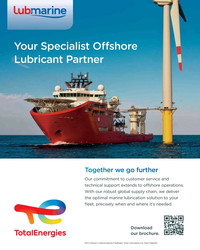 )
April 2024 - Maritime Reporter and Engineering News page: 3rd Cover
)
April 2024 - Maritime Reporter and Engineering News page: 3rd CoverYour Specialist Ofshore Lubricant Partner T Togeth her w we go o furt ther r Our commitment to customer service and technical support extends to ofshore operations. With our robust global supply chain, we deliver the optimal marine lubrication solution to your ?eet, precisely when and where it’s needed.
-
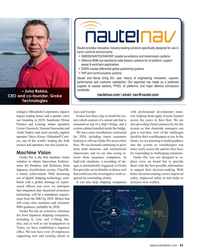 )
April 2024 - Maritime Reporter and Engineering News page: 41
)
April 2024 - Maritime Reporter and Engineering News page: 41Nautel provides innovative, industry-leading solutions speci? cally designed for use in harsh maritime environments: • GMDSS/NAVTEX/NAVDAT coastal surveillance and transmission systems • Offshore NDB non-directional radio beacon systems for oil platform, support vessel & wind farm applications
-
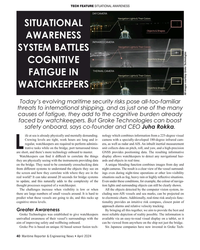 )
April 2024 - Maritime Reporter and Engineering News page: 40
)
April 2024 - Maritime Reporter and Engineering News page: 40TECH FEATURE SITUATIONAL AWARENESS SITUATIONAL AWARENESS SYSTEM BATTLES COGNITIVE FATIGUE IN WATCHKEEPERS All images courtesy Groke Technologies Today’s evolving maritime security risks pose all-too-familiar threats to international shipping, and as just one of the many causes of fatigue, they add
-
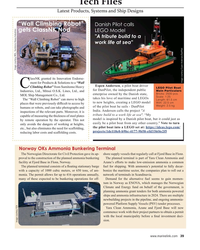 )
April 2024 - Maritime Reporter and Engineering News page: 39
)
April 2024 - Maritime Reporter and Engineering News page: 39Tech Files Latest Products, Systems and Ship Designs “Wall Climbing Robot” Danish Pilot calls gets ClassNK Nod LEGO Model "A tribute build to a work life at sea" Image courtesy MOL, Sumitomo Heavy Industries lassNK granted its Innovation Endorse- Image courtesy Espen Andersen/DanPilot ment for
-
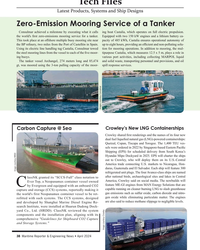 )
April 2024 - Maritime Reporter and Engineering News page: 38
)
April 2024 - Maritime Reporter and Engineering News page: 38Tech Files Latest Products, Systems and Ship Designs Zero-Emission Mooring Service of a Tanker Consulmar achieved a milestone by executing what it calls ing boat Castalia, which operates on full electric propulsion. the world's ? rst zero-emissions mooring service for a tanker. Equipped with two 150 kW
-
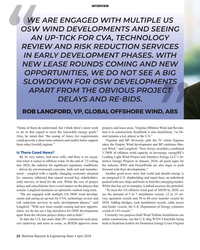 )
April 2024 - Maritime Reporter and Engineering News page: 22
)
April 2024 - Maritime Reporter and Engineering News page: 22INTERVIEW WE ARE ENGAGED WITH MULTIPLE US OSW WIND DEVELOPMENTS AND SEEING AN UP-TICK FOR CVA, TECHNOLOGY REVIEW AND RISK REDUCTION SERVICES IN EARLY DEVELOPMENT PHASES. WITH NEW LEASE ROUNDS COMING AND NEW OPPORTUNITIES, WE DO NOT SEE A BIG SLOWDOWN FOR OSW DEVELOPMENTS APART FROM THE OBVIOUS
-
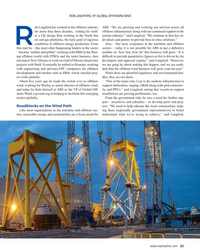 )
April 2024 - Maritime Reporter and Engineering News page: 21
)
April 2024 - Maritime Reporter and Engineering News page: 21incentives and subsidies – to develop ports and proj- Roadblocks on the Wind Path ects. “We need to help educate the local communities, help- Like most organizations in the maritime and offshore sec- ing them [especially government representatives] to better tors, renewable energy and sustainability are a focus
-
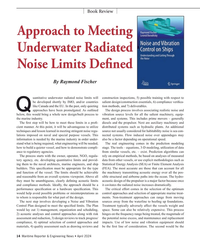 )
April 2024 - Maritime Reporter and Engineering News page: 14
)
April 2024 - Maritime Reporter and Engineering News page: 14Plan designed to meet the speci? ed limits. The Plan Treatment typically adversely affect the vessels weight and would lay out 1) management, organization and scheduling, space. Some can also be relatively expensive. This process 2) acoustic analyses and control approaches along with risk hinges
-
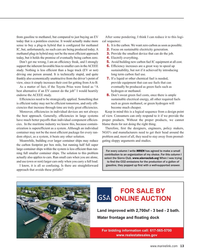 )
April 2024 - Maritime Reporter and Engineering News page: 13
)
April 2024 - Maritime Reporter and Engineering News page: 13than run- For every column I write MREN has agreed to make a small ning full smaller container ships. The solution to this problem contribution to an organization of my choice. For this column I actually also applies to cars. Run small cars when you are alone, select the Sierra Club. www.sierraclub.org When
-
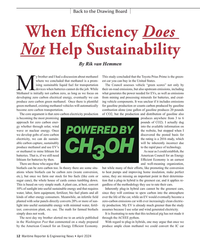 )
April 2024 - Maritime Reporter and Engineering News page: 12
)
April 2024 - Maritime Reporter and Engineering News page: 12need American Council for an Energy lithium for batteries by then. Ef? cient Economy is an earnest There are those who argue that and well-meaning organization, biofuels can be zero carbon too. In theory there are some situ- but while many of their efforts, like promoting the conversion ations where biofuels
-
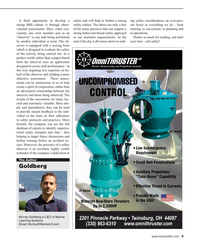 )
April 2024 - Maritime Reporter and Engineering News page: 9
)
April 2024 - Maritime Reporter and Engineering News page: 9and venient, one crew member acts as an strong behaviour-based safety approach to operations. “observer” to any task being performed in our maritime organizations. At the Thanks so much for reading, and until by another individual or team. The ob- end of the day it all comes down to mak- next time - sail
-
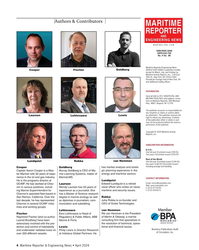 )
April 2024 - Maritime Reporter and Engineering News page: 4
)
April 2024 - Maritime Reporter and Engineering News page: 4Authors & Contributors MARITIME REPORTER AND ENGINEERING NEWS M A R I N E L I N K . C O M ISSN-0025-3448 USPS-016-750 No. 4 Vol. 86 Maritime Reporter/Engineering News (ISSN # 0025-3448) is published monthly Cooper Fischer Goldberg except for March, July, and October by Maritime Activity Reports, Inc.
-
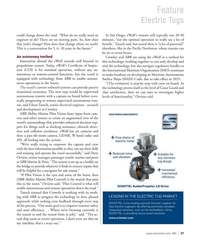 )
April 2024 - Marine News page: 37
)
April 2024 - Marine News page: 37Inspec- trial the technology, but also navigate regulatory hurdles as tion (COI) is for standard operation, without any au- the International Maritime Organization (IMO) continues tonomous or remote-control functions, but the vessel is to make headway on developing its Maritime Autonomous equipped with technology
-
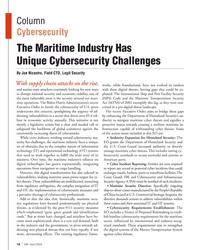 )
April 2024 - Marine News page: 18
)
April 2024 - Marine News page: 18Column Cybersecurity The Maritime Industry Has Unique Cybersecurity Challenges By Joe Nicastro, Field CTO, Legit Security With supply chain attacks on the rise, works, while foundational, have not evolved in tandem and nation-state attackers constantly looking for new ways with these digital threats
-
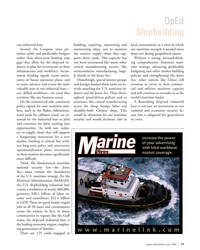 )
April 2024 - Marine News page: 17
)
April 2024 - Marine News page: 17OpEd Shipbuilding can industrial base. building, repairing, repowering and local communities at a time in which Second, the Congress must pri- maintaining ships, not to mention our maritime strength is needed more oritize stable and predictable budgets the massive supply chain that sup- than ever
-
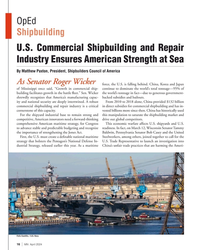 )
April 2024 - Marine News page: 16
)
April 2024 - Marine News page: 16OpEd Shipbuilding U.S. Commercial Shipbuilding and Repair Industry Ensures American Strength at Sea By Matthew Paxton, President, Shipbuilders Council of America As Senator Roger Wicker force, the U.S. is falling behind. China, Korea and Japan of Mississippi once said, “Growth in commercial ship-
-
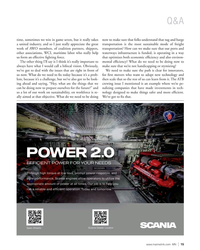 )
April 2024 - Marine News page: 15
)
April 2024 - Marine News page: 15Q&A time, sometimes we win in game seven, but it really takes now to make sure that folks understand that tug and barge a united industry, and so I just really appreciate the great transportation is the most sustainable mode of freight work of AWO members, of coalition partners, shippers, transportation?
-
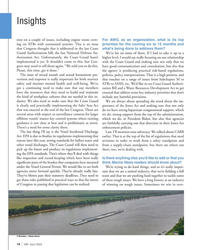 )
April 2024 - Marine News page: 14
)
April 2024 - Marine News page: 14Insights tion on a couple of issues, including engine room crew- For AWO, as an organization, what is its top ing on ATBs with automated systems. This is an issue priorities for the coming six to 12 months and that Congress thought that it addressed in the last Coast what’s being done to address them? Gua
-
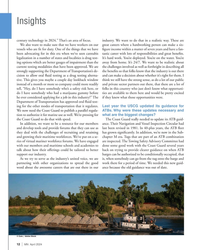 )
April 2024 - Marine News page: 12
)
April 2024 - Marine News page: 12, that As we try to serve as the industry’s united voice, we are is, when somebody can go from the tug onto the barge and partnering with other organizations to spread the good work there for a period of time. We needed this new guid- word about the awesome careers that are out there in our ance because
-
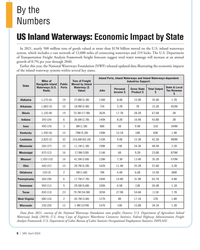 )
April 2024 - Marine News page: 8
)
April 2024 - Marine News page: 8By the Numbers US Inland Waterways: Economic Impact by State In 2021, nearly 500 million tons of goods valued at more than $158 billion moved on the U.S. inland waterways system, which includes a vast network of 12,000 miles of connecting waterways and 219 locks. The U.S. Department of Transportation
-
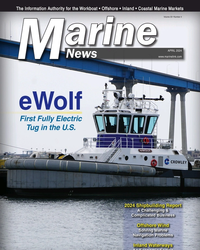 )
April 2024 - Marine News page: Cover
)
April 2024 - Marine News page: CoverThe Information Authority for the Workboat • Offshore • Inland • Coastal Marine Markets Volume 35 • Number 4 arine APRIL 2024 www.marinelink.com News M eWolf First Fully Electric Tug in the U.S. 2024 Shipbuilding Report A Challenging & Complicated Business Offshore Wind Solving Marine Navigation Problems
-
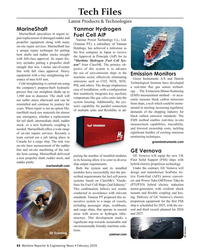 )
February 2024 - Maritime Reporter and Engineering News page: 44
)
February 2024 - Maritime Reporter and Engineering News page: 44Tech Files Latest Products & Technologies MarineShaft Yanmar Hydrogen MarineShaft specializes in urgent re- Fuel Cell AIP pair/replacement of damaged rudder and Yanmar Power Technology Co., Ltd. propeller equipment along with many (Yanmar PT), a subsidiary of Yanmar on-site repair services. MarineShaft
-
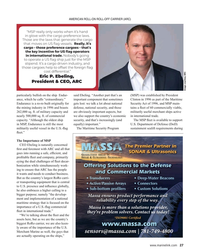 )
February 2024 - Maritime Reporter and Engineering News page: 27
)
February 2024 - Maritime Reporter and Engineering News page: 27AMERICAN ROLL-ON ROLL-OFF CARRIER (ARC) “MSP really only works when it’s hand in glove with the cargo preference laws. Those are the laws that generate the cargo that moves on US ? ag vessels. Really, it’s cargo – those preference cargoes – that’s the key incentive for US ? ag operators in internatio
-
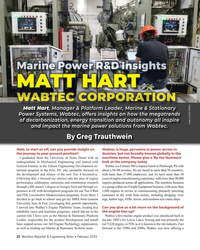 )
February 2024 - Maritime Reporter and Engineering News page: 22
)
February 2024 - Maritime Reporter and Engineering News page: 22for the product development and install the late 1960’s for Lower Lakes Towing and was primarily the base support across our full Engine Technology organization, rail V228 engine, or FDL as it is known in the rail industry. Fast as well as leading our Marine & Stationary Systems team. forward to the 1990s
